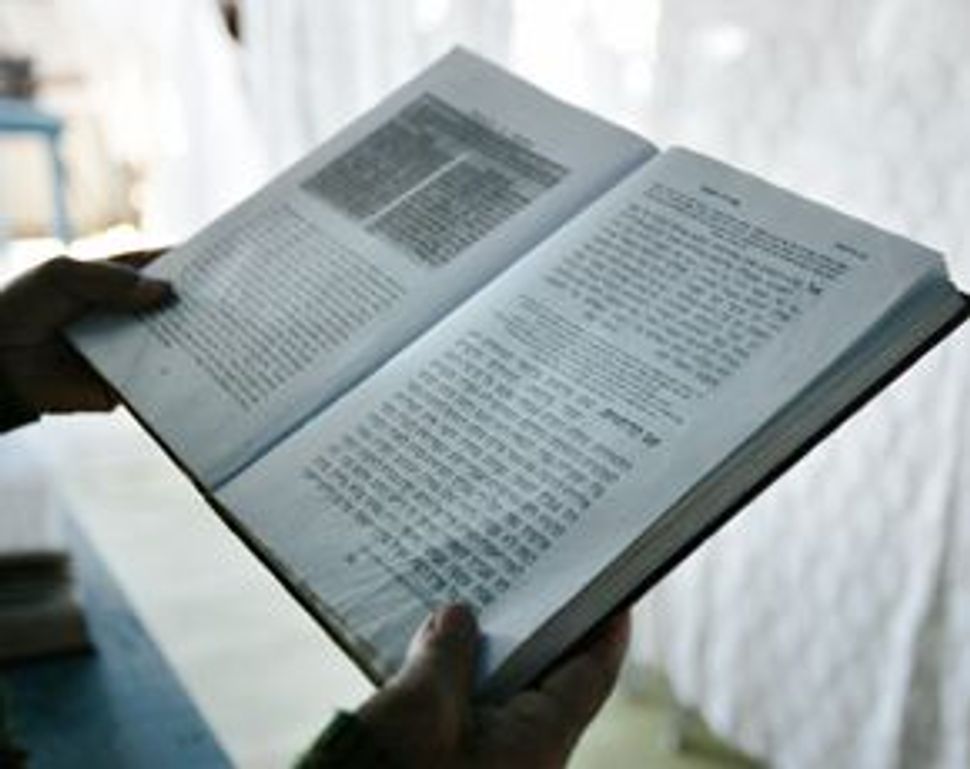Putting the Old in Old Testament

Image by getty images
Israel’s government wants to put the “old” back into the Old Testament.

Image by getty images
Following a 30-year absence, the Education Ministry has announced the return of its adult International Bible Quiz, an annual competition that tests contestants’ knowledge of the Torah, Prophets and Scriptures. Restricted in recent decades to young students, a second edition of the Bible Quiz will be offered this year for Israeli adults, with a final round in Jerusalem to be televised nationally during Hanukkah.
Designed, in the words of an Education Ministry statement, to bolster interest in the Bible’s “social, national and human values,” the contest has already drawn strong interest from around the country, with more than 1,500 competitors signing up since registration began in late April. Although focused exclusively on Jewish texts — the 2010 theme is “leadership,” as defined in Deuteronomy 1:13 — the contest has attracted the interest of at least one Israeli-Arab participant. “If the Jewish people would learn the Quran and the Arab people would be exposed to Torah study, it would bridge the gaps [between us],” said Shadi Abu Erar, a 29-year-old teacher from the Negev, speaking to the news Web site Ynet.
Kicking off in late July, the contest will narrow its opening field by region, with finalists converging on Jerusalem in December. The Education Ministry plans to expand the adult competition in 2011, mirroring its student Bible Quiz with both national and international editions.
Rules for the adult contest disqualify winners of the international student Bible Quiz, held annually on Israel Independence Day. That precludes the participation of 2010 champion Or Ashual, a 17-year-old from Kfar Saba, but leaves the door open — in a few more years, at least — for Avner Netanyahu, the 15-year-old son of Israel’s prime minister.
In a widely covered showdown, the younger Netanyahu won the national Bible Quiz in March, but placed third in the international contest a month later.
The Forward is free to read, but it isn’t free to produce

I hope you appreciated this article. Before you go, I’d like to ask you to please support the Forward.
Now more than ever, American Jews need independent news they can trust, with reporting driven by truth, not ideology. We serve you, not any ideological agenda.
At a time when other newsrooms are closing or cutting back, the Forward has removed its paywall and invested additional resources to report on the ground from Israel and around the U.S. on the impact of the war, rising antisemitism and polarized discourse.
This is a great time to support independent Jewish journalism you rely on. Make a gift today!
— Rachel Fishman Feddersen, Publisher and CEO
Support our mission to tell the Jewish story fully and fairly.
Most Popular
- 1

Culture Cardinals are Catholic, not Jewish — so why do they all wear yarmulkes?
- 2

News School Israel trip turns ‘terrifying’ for LA students attacked by Israeli teens
- 3

Fast Forward Ye debuts ‘Heil Hitler’ music video that includes a sample of a Hitler speech
- 4

Fast Forward Student suspended for ‘F— the Jews’ video defends himself on antisemitic podcast
In Case You Missed It
-

Yiddish קאָנצערט לכּבֿוד דעם ייִדישן שרײַבער און רעדאַקטאָר באָריס סאַנדלערConcert honoring Yiddish writer and editor Boris Sandler
דער בעל־שׂימחה האָט יאָרן לאַנג געדינט ווי דער רעדאַקטאָר פֿונעם ייִדישן פֿאָרווערטס.
-

Fast Forward Trump’s new pick for surgeon general blames the Nazis for pesticides on our food
-

Fast Forward Jewish feud over Trump escalates with open letter in The New York Times
-

Fast Forward First American pope, Leo XIV, studied under a leader in Jewish-Catholic relations
-
Shop the Forward Store
100% of profits support our journalism
Republish This Story
Please read before republishing
We’re happy to make this story available to republish for free, unless it originated with JTA, Haaretz or another publication (as indicated on the article) and as long as you follow our guidelines.
You must comply with the following:
- Credit the Forward
- Retain our pixel
- Preserve our canonical link in Google search
- Add a noindex tag in Google search
See our full guidelines for more information, and this guide for detail about canonical URLs.
To republish, copy the HTML by clicking on the yellow button to the right; it includes our tracking pixel, all paragraph styles and hyperlinks, the author byline and credit to the Forward. It does not include images; to avoid copyright violations, you must add them manually, following our guidelines. Please email us at [email protected], subject line “republish,” with any questions or to let us know what stories you’re picking up.















